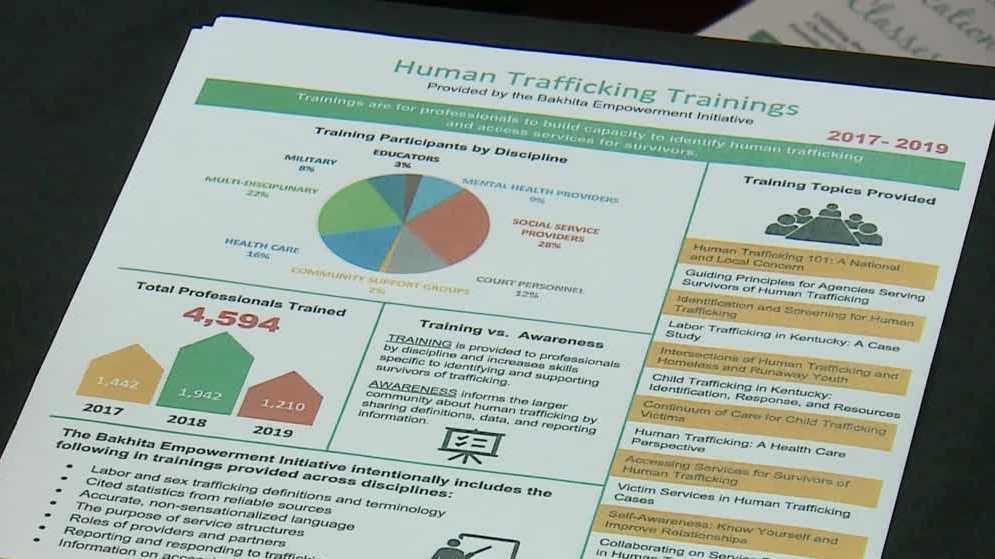Free training series teaches community leaders to identify, prevent human trafficking in Louisville

LOUISVILLE, Ky. — Community leaders are learning to identify and prevent human trafficking in Louisville through a free, two-part training series.
Professionals participated in one of two informative sessions on Tuesday at the Southwest Regional Library on Dixie Highway.
The Louisville Metro Office for Women is hosting the series in collaboration with several organizations to train local leaders to fight human trafficking and better support survivors.
Funded by Metro United Way, the series is educating people working in violence prevention, social services, housing, youth services, healthcare, education and law enforcement on the importance of trauma-informed care and survivor engagement.
“We're trying to go more upstream, look at prevention, look at addressing root causes such as lack of affordable housing and look at trauma-informed approaches that are victim-centered,” Office for Women Executive Administrator Gretchen Hunt told WLKY.
Human trafficking is a current concern in Louisville.
“We know it's happening in our communities,” said Marissa Castellanos, program director of the Bakhita Empowerment Initiative of Catholic Charities. “We know that individuals are being exploited and trafficked for both sex and for labor.”
According to the Kentucky Cabinet for Health and Family Services, 222 child trafficking incidents were reported in Jefferson County between 2013 and 2020. Statewide, more than 1,400 cases have been reported since 2007.
While the issue affects people of all ages, genders, and backgrounds, the Office for Women said marginalized groups are the most impacted. Women and children, LGBTQ individuals, those experiencing homelessness, and people with substance use disorders or other disabilities are common victims of human trafficking.
The collaborative training series is equipping Louisville leaders with that information and more to help them take action.
“I think one thing that all of us can do is to try to be aware, to try to get more information about what trafficking is,” Castellanos said.
“Report it if you see it,” said training participant Kenya Wade. “Don't just walk by. Don't turn a blind eye. It needs to be confronted.”
“These cases are complex. They can't be done by law enforcement or victim services alone,” Hunt said. “They require multiple groups of people working together, community members who have trust with the community and can help refer individuals.”
The next step is to invest in prevention. Organizers hope the training series will lead to a more coordinated response to local human trafficking cases.
Part two of training is Nov. 1 from 9:30 a.m. to 4:30 p.m. at the Southwest Regional Library on Dixie Highway.
The Office for Women, Louisville Metro Department of Public Health and Wellness Center for Health Equity, the Bakhita Empowerment Initiative of Catholic Charities, and the Trauma Resilient Communities Project of the Office for Safe & Healthy Neighborhoods are working together to put on the series.
Anyone who may be a victim of human trafficking can call the National Human Trafficking Hotline anytime at 1-888-373-7888.
This “Eyes on Trafficking” story is reprinted from its original online location.
 ABOUT PBJ LEARNING
ABOUT PBJ LEARNING
PBJ Learning is a leading provider of online human trafficking training, focusing on awareness and prevention education. Their interactive Human Trafficking Essentials online course is used worldwide to educate professionals and individuals how to recognize human trafficking and how to respond to potential victims. Learn on any web browser (even your mobile phone) at any time.
More stories like this can be found in your PBJ Learning Knowledge Vault.
EYES ON TRAFFICKING
This “Eyes on Trafficking” story is reprinted from its original online location.
ABOUT PBJ LEARNING
PBJ Learning is a leading provider of online human trafficking training, focusing on awareness and prevention education. Their interactive Human Trafficking Essentials online course is used worldwide to educate professionals and individuals how to recognize human trafficking and how to respond to potential victims. Learn on any web browser (even your mobile phone) at any time.
More stories like this can be found in your PBJ Learning Knowledge Vault.
